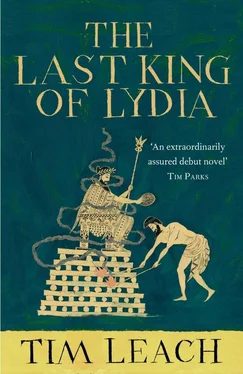Tim Leach - The Last King of Lydia
Здесь есть возможность читать онлайн «Tim Leach - The Last King of Lydia» весь текст электронной книги совершенно бесплатно (целиком полную версию без сокращений). В некоторых случаях можно слушать аудио, скачать через торрент в формате fb2 и присутствует краткое содержание. Год выпуска: 2013, ISBN: 2013, Издательство: Atlantic Books Ltd, Жанр: Исторические приключения, на английском языке. Описание произведения, (предисловие) а так же отзывы посетителей доступны на портале библиотеки ЛибКат.
- Название:The Last King of Lydia
- Автор:
- Издательство:Atlantic Books Ltd
- Жанр:
- Год:2013
- ISBN:9780857899200
- Рейтинг книги:5 / 5. Голосов: 1
-
Избранное:Добавить в избранное
- Отзывы:
-
Ваша оценка:
- 100
- 1
- 2
- 3
- 4
- 5
The Last King of Lydia: краткое содержание, описание и аннотация
Предлагаем к чтению аннотацию, описание, краткое содержание или предисловие (зависит от того, что написал сам автор книги «The Last King of Lydia»). Если вы не нашли необходимую информацию о книге — напишите в комментариях, мы постараемся отыскать её.
The Last King of Lydia — читать онлайн бесплатно полную книгу (весь текст) целиком
Ниже представлен текст книги, разбитый по страницам. Система сохранения места последней прочитанной страницы, позволяет с удобством читать онлайн бесплатно книгу «The Last King of Lydia», без необходимости каждый раз заново искать на чём Вы остановились. Поставьте закладку, и сможете в любой момент перейти на страницу, на которой закончили чтение.
Интервал:
Закладка:
She stood, and before he could find another word to say, she walked away into the women’s quarters, the one place in the palace where he could not follow her. He listened, and thought he heard laughter from somewhere within, before all sound of her was lost.
He waited on the couch for a time, to see if she would return. When she did not, he rose and walked back out onto the balcony.
The sun was low in the sky, the red light echoing the carnage of the sacrifice. The stone floor of the balcony had been scrubbed clean and no trace of death remained, but when he looked down at his hands he found blood dried beneath his fingernails. He picked at it and rolled it to powder between his fingers, and then looked down on the streets below.
He saw a fire burning in the centre of the square, ringed by a dozen priests in heavy white robes. Piled beside them were the fat and bones of the twelve thousand dead — a mountain of offerings over which the flies swarmed in a cloud of black motion. All around the square, the people of Sardis had returned to the rooftops, having shed their bloody tunics for their finest clothing, ready to observe the next stage of the sacrifice.
For over an hour, the priests fed the offerings to the Gods. The unburned bones piled thickly around the fire, and it came to resemble one of the mass funeral pyres that are to be found at the end of a great battle. The crowd watched in respectful silence as each sacrifice was offered, though here and there he saw mothers hushing bored children with sharp warnings and slaps. The only other sounds were the roar and crackle of the fire, and the deep, throaty chants of the supplication the priests made to the Gods.
When all of the meat had been offered up to the fire, the time came for the second sacrifice: the gift of gold.
Croesus watched as the gates of the palace opened beneath him, and a convoy of a dozen carts rolled out, each one piled high with wealth from the heart of the palace, much of it from his own private quarters. Gold cups and silver-edged plates, elaborately crafted wooden chairs, heavy weaves of rare fabrics that had travelled from half the world, gilded couches studded with jewels. Each cart held more wealth than most of the people of Sardis would have seen in a lifetime.
The priests cleared a path for the carts, until the convoy was at the edge of the fire. The men with the first cart crouched down and laid their hands upon it, rocking it back and forth on its axles once, twice, three times. The third time, they gave a wordless cry and thrust it forward, their legs pushing hard against the stone and driving the cart towards the fire. They released it a few feet from the edge and skidded to a stop as the cart plunged forward, rocked up over the wood at the edge, tipped to one side and fell into the heart of the fire.
One by one, the remaining eleven carts followed, and the fire flared up, brighter than before. Soon, the cushions of the couches were blackening in the heat, the wood popping and cracking, the inlaid gold melting and running in priceless rivulets down to the bloody ground. Golden goblets warped and melted, finely worked leather belts cracked and disintegrated into ash.
Croesus watched as each family came forward in turn to make an offering of its own. The poor could offer only the crude clay pots and bowls that they had used for decades of simple meals, an old blanket for the cold winter months, the small, crude smock intended for a child that had been stillborn. Merchants offered the fine wines that they had hoarded for a day of celebration or for the bribery of a stubborn official, pulled the gold rings from their fingers and hurled them into the hungry, wasteful flames. Old men threw in the iron spears they had kept to remember their glorious, younger days, and children were encouraged to donate the toys and trinkets that were their own personal treasures. Many of the people burned too much, burned away their legacies of golden cups or silver jewellery that they had spent a lifetime trying to acquire and pass on to their children. Dozens of families ruined themselves for generations, infected by the sacred destruction of so much wealth. Within an hour, a tenth of the wealth of the city had been burned as an offering to the Gods.
After it was done, the people of the city returned to their homes, moving slowly through the crowded streets. Croesus waited, and soon pale smoke began to rise as they lit thousands of fires. The rich scent of cooking meat clung to the smoke, and the separate tendrils intertwined and thickened in the air until a single cloud hung over the entire city. A traveller viewing Sardis from a distance would have thought that it must have been burning under the torches of a foreign invader. The city had never known a festival like it.
Croesus waited on the balcony, until the stars were clustered thick in the clear sky, and he could identify the constellations of the Gods whose favour he sought to buy with blood and gold. After a time, he became aware of another presence behind him. He turned quickly, hoping that it would be his wife come to ask forgiveness.
But it was Isocrates. The slave looked weary, and had permitted himself the luxury of leaning against a wall as he waited. He gazed at his master with attentive eyes, ready to serve.
‘Of course,’ Croesus said. ‘Everywhere I turn, there you are.’
‘Would you like me to leave you alone, master?’
‘No. Please, stay.’
Croesus looked down on the square, empty of people, filled with ashes and blood. ‘Can a god be bought?’ he said. ‘Or is it men that I buy with this sacrifice?’
‘Does it matter?’
‘Quite.’ Croesus hesitated. ‘My wife hates me, I think.’
Isocrates said nothing. A moment later, Croesus continued.
‘No, she doesn’t hate me,’ he said. ‘But she has closed herself to me.’ He leaned forward slowly, rested his forehead against the stone lip of the balcony. He straightened up a moment later, as the weakness passed.
‘You are well, Isocrates?’
‘I have no complaints, master.’
‘You never do. It is remarkable. And your wife?’
‘She is well, master.’ The slave paused for a moment. ‘She says she has not seen you for some time.’
‘I have no time for Gyges,’ Croesus said. ‘Not now, in any case. But I am sorry not to have seen Maia. You heard about the statue?’
‘I did, master. You honour us too greatly.’
‘No, I don’t think that I do.’ The king turned to face his slave. ‘I trust no one but you now. Isn’t that strange?’ Without waiting for a reply, he brushed past his slave and disappeared into the darkness of the palace.
Isocrates waited until his master’s echoing footsteps had fallen silent. Satisfied that he was alone, he walked forward and looked out over the balcony, resting his elbows on the edge where his master’s arms had rested only moments before. Had any citizen been gazing up from the streets below and seen the distant figure looking down over the city, they would have thought Isocrates was the king, watching over the people he ruled and weighing the fates of nations. Not a slave whose life depended on the whims of the man who owned him.
He looked down, and watched another convoy leave the gates of the palace. The third sacrifice, the gifts that had taken months to produce, taking their first steps towards the oracle at Delphi. The sacrifice of the animals and the burning of the people’s treasures had been but a prelude to this, the great gift to the Gods.
The darkness was almost impenetrable, and the convoy had lit no torches to illuminate their way, but Isocrates thought that he could identify the glinting outline of a golden statue of his wife in one of the carts below.
He imagined the journey that the gifts would take. He thought of the carts rolling along the clear, wide merchant’s road along the banks of the Hermus to Phocaea. They would spend at least a night there, the convoy guards drinking and whoring in the port taverns, brawling with sailors who had come from half a world away to trade for the golden coins of Lydia. Then they would roll onto a ship and sail out upon the deep Aegean, its colour that of the sky in another, perfect world. They would travel past the islands that loomed in the distance like mountain peaks above a sea of clouds, past solitary merchant vessels and the pirate ships that hunted them, until they made landfall at Phaleron and continued to Athens. The excisemen of Athens would extract double the usual levy from the foreigners, and the Lydians would pay gladly, the bribe a mere fraction of the riches they carried with them.
Читать дальшеИнтервал:
Закладка:
Похожие книги на «The Last King of Lydia»
Представляем Вашему вниманию похожие книги на «The Last King of Lydia» списком для выбора. Мы отобрали схожую по названию и смыслу литературу в надежде предоставить читателям больше вариантов отыскать новые, интересные, ещё непрочитанные произведения.
Обсуждение, отзывы о книге «The Last King of Lydia» и просто собственные мнения читателей. Оставьте ваши комментарии, напишите, что Вы думаете о произведении, его смысле или главных героях. Укажите что конкретно понравилось, а что нет, и почему Вы так считаете.












